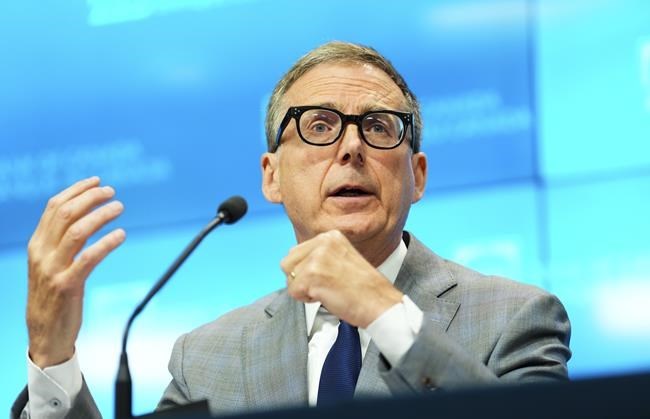OTTAWA — Bank of Canada Governor Tiff Macklem says the central bank will be deciding whether to exert patience at its next rate meeting or hike rates further.
Macklem held a virtual roundtable with reporters from the sidelines of the annual International Monetary Fund meetings in Marrakech, Morocco on Friday morning.
The governor previewed what the Bank of Canada's governing council will be discussing in the lead-up to the Oct. 25 rate decision.
"What I expect it'll focus on is, do we stay with a policy rate of five per cent and let past interest rate increases work through the economy and relieve price pressures or is the weight of the evidence of all those economic indicators, when you put them together, is it telling us that more action is needed to restore price stability," Macklem said.
The governor said while demand in the economy is slowing, core inflation — which strips out price volatility — has remained sticky over the last six to eight months.
"We're not really seeing downward momentum in underlying inflation, and that is a concern," Macklem said.
The Bank of Canada held its key interest rate steady last month, but signalled it hasn't closed the door to more rate hikes if needed.
Canada's annual inflation rate was four per cent in August, while an updated figure for September is expected to be released next week.
The IMF meetings come as the Israel-Hamas conflict continues and risks escalating. When asked on the impact the conflict may have on the global economy, Macklem said it's too early to tell.
"It's far too early to tell. And it really depends on to what extent ... this is as this escalates," Macklem said.
The Russian invasion of Ukraine in February 2022 had a significant impact on commodity prices, fuelling the surge in inflation.
Since then, price growth has slowed significantly and economic conditions are weakening as central banks around the world raise interest rates.
The IMF recently published an updated economic outlook warning the global economy has lost momentum as higher interest rates take hold.
“The global economy is limping along, not sprinting,” IMF chief economist Pierre-Olivier Gourinchas said at a news conference earlier this week.
Here in Canada, the economy has slowed, too. The economy contracted in the second quarter of the year as consumer spending slows.
The labour market has also weakened this year as job vacancies fell and the unemployment rate inched higher. Still, job growth continues as Canada's population surges.
Rising interest rates have sparked backlash from labour groups over the impact tighter financial conditions may have on employment. Political leaders have also stepped in to urge the Bank of Canada, which operates independently from the government, to stop raising interest rates.
Macklem said the turmoil over rising interest rates in the political and public spheres are symptoms of high inflation.
"I think, sadly, what you're seeing is exactly what inflation does. Inflation erodes confidence in institutions, it erodes confidence in governments. It makes people feel like they're getting ripped off. We are seeing more strikes in this country, you're seeing more strikes in other countries. These are symptoms of inflation," Macklem said.
Restoring price stability is the best way to address these issues, the governor said, though he acknowledged getting there won't be easy and will come with financial pain for families.
This report by The Canadian Press was first published Oct. 13, 2023.
— With files from The Associated Press.
Nojoud Al Mallees, The Canadian Press

